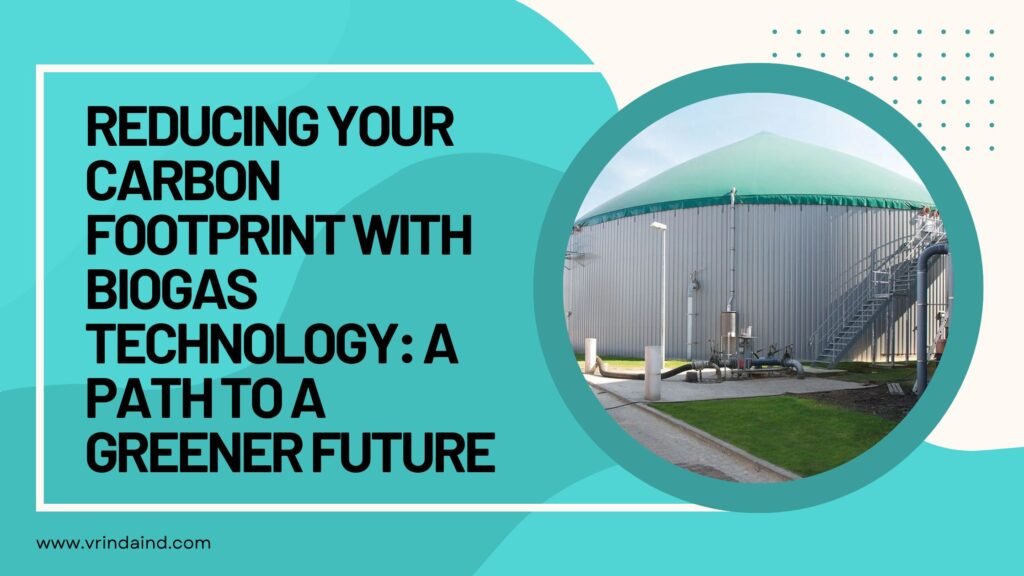In today’s global landscape, the urgency to combat climate change and reduce our carbon footprint has never been greater. Every industry and community seeks effective strategies to minimize their environmental impact. Amongst the most powerful and often overlooked solutions lies biogas technology, a remarkable process that transforms organic waste into valuable resources while significantly curbing harmful emissions.
At Vrinda Industries, as a leading biogas plant equipment exporter, we are committed to providing the innovative solutions that empower organizations to achieve their sustainability goals. Let’s explore how integrating biogas technology can be a game-changer in reducing your carbon footprint.
Understanding Your Carbon Footprint and Why It Matters
Your carbon footprint represents the total amount of greenhouse gases (GHGs), primarily carbon dioxide (CO2) and methane (CH4), released into the atmosphere by your activities or those of your organization. These gases trap heat, contributing to global warming and climate change. Reducing this footprint is crucial for:
Environmental Stewardship: Protecting our planet for future generations.
Regulatory Compliance: Meeting increasingly stringent environmental regulations.
Brand Reputation: Demonstrating commitment to sustainability, valued by consumers and stakeholders.
Operational Efficiency: Often, reducing emissions goes hand-in-hand with resource efficiency.
How Biogas Technology Powerfully Reduces Your Carbon Footprint
- Methane Capture and Utilization:
- Organic waste (like manure, food scraps, industrial effluents) naturally decomposes in landfills or open lagoons, releasing methane (CH4) into the atmosphere. Methane is a greenhouse gas with a global warming potential over 25 times higher than carbon dioxide over a 100-year period.
- Biogas plants capture this methane in a controlled environment, preventing its escape. This captured methane is then converted into useful energy, effectively mitigating its potent warming effect.
- Displacement of Fossil Fuels:
- The biogas produced can be used as a direct replacement for fossil fuels (coal, oil, natural gas) in generating electricity, heat, or even as vehicle fuel (Bio-CNG).
- By using a renewable source of energy, you reduce the demand for and combustion of fossil fuels, thereby cutting down on the associated CO2 emissions.
- Reduced Need for Chemical Fertilizers:
- The digestate, a nutrient-rich byproduct of anaerobic digestion, serves as an excellent organic fertilizer.
- The production of synthetic chemical fertilizers is highly energy-intensive, relying heavily on fossil fuels. By replacing these with bio-fertilizer from digestate, you indirectly reduce emissions from industrial fertilizer manufacturing.
- Reduced Transportation Emissions:
- For industries or farms that previously transported their organic waste to distant landfills or processing facilities, an on-site biogas plant can significantly reduce vehicle emissions associated with waste hauling.
- Sustainable Waste Management:
- Diverting organic waste from landfills through biogas technology reduces landfill volume and prevents uncontrolled decomposition, which is a major source of methane emissions. This holistic organic waste management approach is key to a circular economy.
The Broader Environmental Impact of Biogas Beyond Carbon
Beyond direct carbon footprint reduction, biogas technology offers a host of other environmental benefits:
Improved Air Quality: Reduces odors associated with decomposing waste and minimizes airborne pollutants when biogas replaces burning fossil fuels.
Water Protection: Reduces nutrient runoff and groundwater contamination often associated with raw manure or unmanaged organic waste.
Soil Health Improvement: Digestate enhances soil structure, water retention, and microbial activity, leading to healthier soil and better crop yields.
Resource Efficiency: Maximizes the value extracted from waste, turning a liability into valuable energy and fertilizer.
Vrinda Industries: Empowering Your Green Footprint
As a dedicated biogas plant equipment manufacturer, Vrinda Industries plays a pivotal role in enabling organizations to achieve their environmental goals. Our robust and efficient equipment—from submersible agitators ensuring optimal digestion, to screw feeder pumps for precise waste transfer, and solids-liquid separators for valuable digestate—are designed to maximize biogas production and minimize environmental impact.
By investing in our high-quality biogas equipment, you are not only adopting a sustainable waste management solution but also actively contributing to a substantial reduction in your overall carbon footprint.
Biogas Technology: A Smart Step Towards a Sustainable Tomorrow
Reducing your carbon footprint is a global imperative, and biogas technology offers a powerful, economically viable pathway to achieve it. By harnessing the energy from organic waste, you’re not just managing a byproduct; you’re actively generating clean energy, enriching soil, and directly combating climate change. It’s a commitment to a cleaner, more sustainable future for all.

Contact Vrinda Industries today to discuss how our expertise can help you achieve your sustainability objectives!




